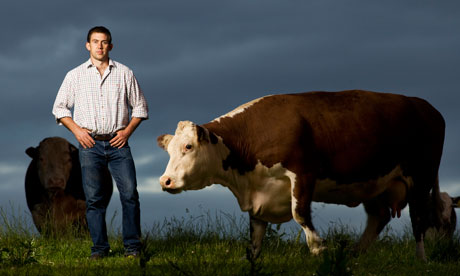
"I am on a one-man mission to show that not all farmers are bad." The person who makes this rather grand statement is not the president of the National Farmers Union or the secretary of state at Defra. It is 32-year-old Richard Thomas, perhaps best known in rural circles for his rendition of Rhinestone Cowboy in a competition at the Royal Show a few years back. But Thomas, a fifth-generation farmer who oversees a modest arable and livestock holding in deepest Herefordshire, is at least partially serious. Farming has developed an image problem and he believes it can only be repaired by small landowners – of whom he is just one of the many thousands – reconnecting with their local community.
As we stand in an open shed, surrounded by sheep that he is preparing to drench for worms, Thomas sets out the charge sheet. He starts historically – from the produce mountains and lakes of the 1970s to hedgerow removal in the 80s to subsidies abuse – and expands to more recent PR disasters such as the contentious culling of badgers to limit the spread of bovine TB.
Research from Farming and Countryside Education shows that urban children connect farming with the words "trampy", "smelly" and "hillbilly". Even rural children pick out "old-fashioned" and "yokel".
Thomas's parents, Diane and Robert, both grew up on farms in Herefordshire and they settled on Diane's family land in the mid-1980s. Risbury Court, which has been farmed since 1843, is a picturesque spot: it covers 260 acres and the family runs 60 cows, mostly pedigree Herefords, and 320 ewes of differing breeds. They have 20 acres of cider apples and Diane has diversified with a green-burial operation on site ("a mad idea," laughs Thomas. "Burying people in a field, who thinks of that?")
Richard, the eldest son, knew from the age of 11 or 12 that he would go into the family business – "I don't like being inside," he says, "it's hard enough sitting down for a couple of hours each week to do the books."
After A-levels, he studied agriculture and marketing at Harper Adams University College in Shropshire. "One of my first lectures," he remembers, "this lady told us how all our businesses were unrealistic because we were farming on subsidies and we weren't looking at cost-efficiency. I walked out and thought, 'Bloody hell! What have I done with my life?' But actually it's going all right."
Thomas sums up his approach as: "Remember what your grandfather taught you but farm with the technology available today." Risbury Court is not organic, but Thomas has strong views on animal welfare and an obvious nostalgia for traditional rural skills. He credits the much-maligned Young Farmers, which has more than 600 clubs and 25,000 members in the UK, for sparking this interest. "I can put a fence up, shear a sheep, lay a hedge and that's all down to them," he says. "I started public speaking there when I was 12, just judging beef or something, and 20 years later I'm debating in the Oxford Union on global food security. How cool is that?
"Yeah, we do go out and have a few beers," he continues, "and occasionally we have a bit too much fun, but is that any different from any urban town on a Saturday night? Probably not."
Thomas feels optimistic about the future. There's a decent price for lamb right now, and although his days are long – 60 hours a week as standard, up to 90 hours during harvest – he has a job and a cottage, something he's aware many his age do not. He even believes that, with a new generation coming through, it should be possible to alter the general perception of British farming.
"We're the custodians of the countryside, aren't we?" he says. "Ultimately people are interested in the land, and the land needs people because otherwise it reverts to trees. If you really get down to it, where do they take their children on a day out? They go to a safari park to see animals or they go to their local farm. What do little boys like doing? They like seeing tractors. Somewhere in everybody they like agriculture, they like rural. They like farming, but it's just been forgotten."

